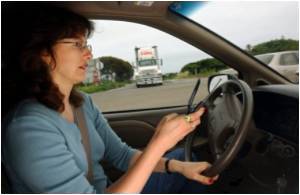Mobile phones must carry warning labels to alert American drivers that they can be deadly distractions, recommends US Transportation Secretary Ray LaHood.

LaHood spoke at the opening of the second US summit on distracted driving, an "epidemic" that killed thousands and injured nearly half a million on US roads last year.
"There's no bigger distraction than people on a cell phone or people texting and driving. There isn't. You can't drive safely doing that," he said.
The number of deaths and injuries blamed on distracted driving has fallen slightly from 5,870 in 2008 to around 5,500 last year thanks to greater awareness of the problem, legal bans, and stiffer punishments, LaHood said.
"We told Americans to 'click it or get a ticket' and we have seen seatbelt use increase to 85 percent, up over 60 percent in the last 15 years," LaHood told the meeting.
"We have reminded Americans that if they are over the limit, they will get arrested. And although driving under the influence is still a serious problem, we have seen drunk-driving fatalities decline by almost 20 percent between 2006 and 2009," he said.
Advertisement
Since last year, 12 more states have passed laws banning text messaging while driving, bringing the total number of states with such bans to 30. The US capital city, Washington, bans mobile phone use while driving as does the US island territory of Guam.
Advertisement
But a poll conducted in June found that one in four US adults and teenagers admitted to sending text messages while driving, and more than six in 10 adults and four in 10 teens said they have talked on the phone while driving.
"Most of all, each one of us needs to take personal responsibility. When you buckle up, put the cellphone and the Blackberry in the glove compartment," said LaHood.
The transportation secretary also announced other measures to reduce distracted driving, including a ban on texting for drivers of trucks carrying hazardous materials, a regulation prohibiting train operators from texting, and a law banning commercial bus and truck drivers from texting on the job.
"You know about the accident in California -- 28 people were killed because a train driver was texting and driving. There's no excuse for that," said LaHood.
"Distracted driving is unsafe, irresponsible, and in a split second, its consequences can be devastating," said LaHood.
"Its victims aren't statistics," he added. "They are moms and dads, sons and daughters, the men and women in this audience who have planned funerals instead of birthdays or weddings."
Source-AFP









